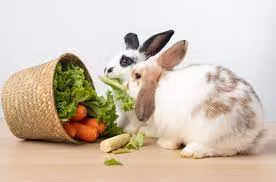What Diet Should You Provide To Your Pet Rabbits

Contributing Editor: Ravi Teja Mandapaka
Understanding a rabbit's dietary needs is essential because what they want to eat may not necessarily be what they should eat. Given the sensitivity of a rabbit's digestive system, offering the right foods for their well-being is crucial.
What to Feed Rabbits
Maintaining a healthy digestive system for your house rabbits is essential, and dietary fiber plays a crucial role in achieving that. To achieve this, it's necessary to include fresh grass, hay, and vegetables as the primary components of their diet instead of relying solely on pellets. Overreliance on shells may lead to obesity and increase the risk of digestive problems in your pet. Pellets do contain fiber, but it's not as effective in stimulating intestinal function as the fiber found in grass hay. Nevertheless, shots can supplement the diet, particularly for picky eaters.
Anything beyond hay, vegetables, and pellets falls into the category of treats and should be given in moderation. Shots should be limited, especially for overweight rabbits, and any reduction in pellet intake should be balanced with a variety of fresh vegetables and continuous access to hay.
Feeding Rabbits Hay
It is essential to ensure that your rabbit always has access to hay, especially grass hays like timothy or oat hay. Initially, some rabbits may show little interest in the hay, but by providing fresh hay a few times a day and reducing pellet portions, your rabbit will likely develop an appetite for grass. For young rabbits, alfalfa should be their primary hay due to its high calcium content, but as they grow older, they can switch to other types of grass, such as timothy, oat hay, or botanical hay.
Vegetables for Rabbits
A significant portion of your rabbit's diet should consist of vegetables, offering a diverse range daily to maintain a balanced diet. Recommended vegetables include carrots, carrot tops, broccoli, greens, beetroot, cauliflower, green beans, fresh maize, tomatoes, cucumber slices, and spinach. However, limiting the intake of spinach and certain greens high in oxalates is essential, as they may lead to bladder stone formation. Beans, cauliflower, cabbage, and potatoes should also be in moderation. Iceberg lettuce, with limited nutritional value and potential to cause diarrhea, is best avoided.
Introduce vegetables to bunnies at or after 12 weeks of age, starting with small amounts and one variety at a time. As you gradually include more vegetables, reduce the pellet quantity and monitor for diarrhea. If diarrhea occurs, discontinue the most recently added vegetable.
Feeding Rabbit Pellets
Pellets are primarily formulated for commercial rabbit production and tend to be calorie-dense. Feeding house rabbits unlimited pellets can lead to obesity, associated health problems, and an excess of certain nutrients. While shells offer balanced nutrition, limiting their quantity and prioritizing fresh vegetables and grasshays is advisable.
Opt for high-quality, fresh pellets containing at least 20-25% fiber, around 14% protein (with no animal protein), and less than 1% calcium, especially for spayed/neutered house rabbits. The pellets for adult rabbits should be carefully adjusted based on their weight. As a guideline, a 5 to 7 lbs. rabbit should receive about 1/4 cup of pellets, while a 3.5 to 4.9 kg. Rabbit can have 1/2 cup and a 5 to 7 kg. Rabbit should receive 3/4 cup. Baby rabbits can have pellets at all times initially, with the quantity decreasing to 1/2 cup per 3 kg. of body weight around six months of age.
Treats for Rabbits
If you have a mature adult rabbit weighing around 3 kg, you can give them up to 2 tablespoons of fresh fruit daily. Some safe fruits you can feed your rabbit include seedless apples, bananas, berries, seedless cherries, grapes, melons, oranges, papayas, peaches, pears, pineapples, plums, and watermelons. Avoid giving rabbit pet store treats marketed for rabbits as they are often unnecessary and may cause digestive problems due to their high sugar or carbohydrate content.
__________________________________________
About Author
Ravi Teja Mandapaka is a multifaceted scholar, poet, and passionate advocate for animals. From English literature to agricultural sciences, from field hockey to music and the arts, Ravi's diverse interests converge in his unwavering commitment to animal welfare. He believes in a journey where compassion meets creativity, and academia blends with advocacy.
 https://www.linkedin.com/in/ravimandapaka/
https://www.linkedin.com/in/ravimandapaka/


